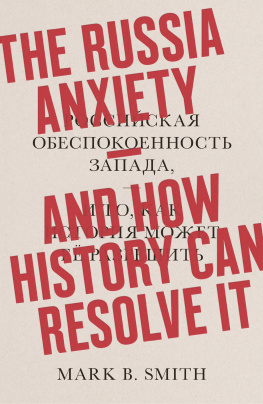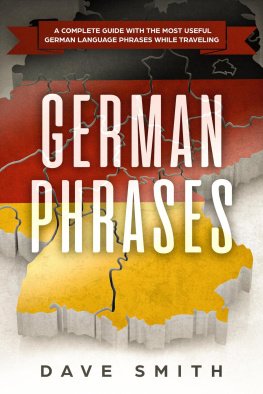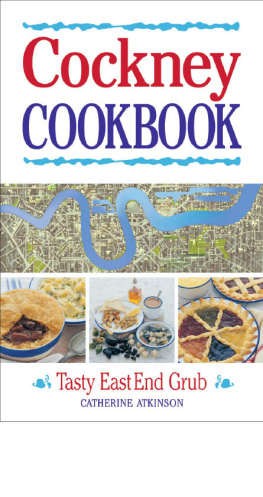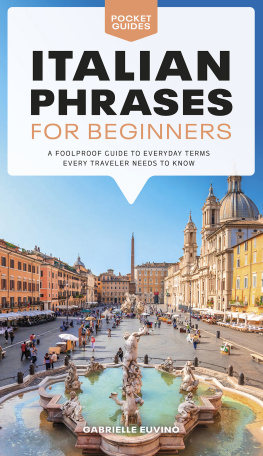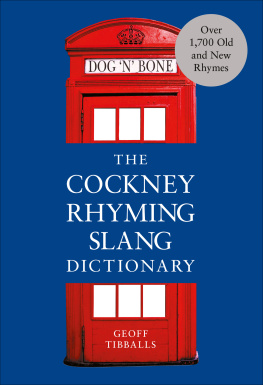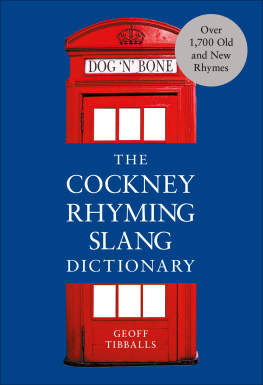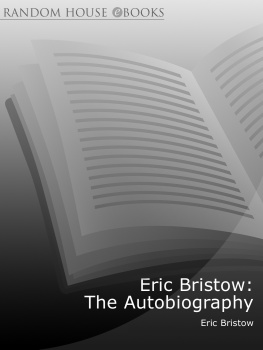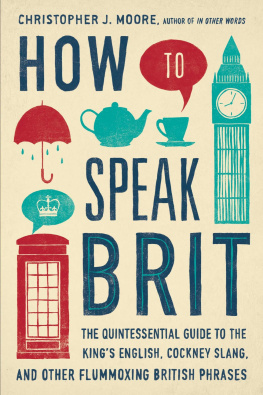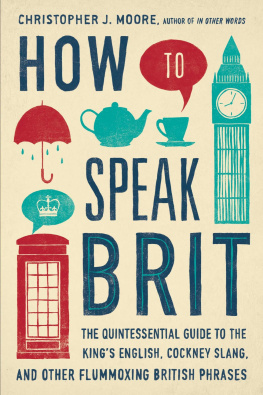First published in Great Britain in 2011 by
Michael OMara Books Limited
9 Lion Yard
Tremadoc Road
London SW4 7NQ
This electronic edition published in 2014
Copyright Michael OMara Books Limited 2011
All rights reserved. No part of this publication may be reproduced, stored in a retrieval system, or transmitted by any means, without the prior permission in writing of the publisher, nor be otherwise circulated in any form of binding or cover other than that in which it is published and without a similar condition including this condition being imposed on the subsequent purchaser.
A CIP catalogue record for this book is available from the British Library.
ISBN: 978-1-84317-574-2 in hardback print format
ISBN: 978-1-78243-382-8 in ebook format
www.mombooks.com
Cover design by Ana Bjezancevic
Designed and typeset by K DESIGN, Winscombe, Somerset
FOR ROSIE, THE TROUBLE AND STRIFE
CONTENTS
Slang comes in many different forms but they are all essentially informal secret languages, in which particular words are replaced with other words and phrases to hide the meaning of a sentence from those not versed in that particular slang code.
If you asked a sample of people to name a particular sort of slang, you could almost guarantee that Cockney rhyming slang would be the most common answer. The Oxford English Dictionary defines rhyming slang thus: a variety of (orig. Cockney) slang in which a word is replaced by a phrase which rhymes with it. The pattern is, by and large, straightforward: take your subject word and replace it with a short phrase (typically two or three words), in which the last word rhymes with the subject word. Then contract the phrase so that the rhyming word is left out (a process that according to Bill Bryson goes under the technical name hemiteleia), leaving you with a code designed to mystify those whose ears are not attuned. The general pattern in neatly demonstrated in this example of perhaps the best known of all rhyming slang phrases:
stairs (subject word) apples and pears (rhyming phrase) apples (how the phrase is commonly rendered)
Rhyming slang is always changing and evolving, unconstrained by formal rules. Indeed, even to think of it as a distinctly Cockney language is outdated. While it emerged on the streets of London, it is now used by a community that lives far outside those narrow boundaries. In its early days it was the language of costermongers (street traders) and criminals who did not want word of their business to fall on the wrong ears. But there were all sorts of other influences too. London had long been a destination for immigrants and many of these groups brought with them distinct slangs of their own, notably the Jewish population, the Irish, the Huguenots and the Romanies. The docks, a melting pot of international cultures, birthed yet more slang forms, as did Londons theatre community. Each group contributed to the rich slang culture that thrived in the capital.
When Cockney rhyming slang first appeared on the scene is a contentious question but it is fair to say that it was widespread by the mid-nineteenth century and reached a peak of popularity in the early part of the twentieth century (perhaps as a result of the fluid social contacts that occurred as a result of the First World War). John Camden Hotten is generally credited with being the first person to talk specifically of Cockney rhyming slang, in his 1859 Dictionary of Modern Slang, Cant and Vulgar Words. He suggested its roots lay in the 1840s, though he credits the criminal classes rather than the street traders:
The cant, which has nothing to do with that spoken by the costermongers, is known in Seven Dials and elsewhere as the Rhyming Slang, or the substitution of words and sentences which rhyme with other words intended to be kept secret. I learn that the rhyming slang was introduced about twelve or fifteen years ago.
Around the same time that Hotten published his study, a certain Duncange Anglicus was writing The Vulgar Tongue: A Glossary of Slang, Cant, and Flash Words and Phrases used in London. A review of it appeared in the Athenaeum, a popular literary magazine of the day, in January 1859 and hints at the rapidly growing popularity of the citys informal idioms:
Now that Slang is everywhere fashionable,in the street, on the platform, in the drawing-roomthis curious little handbook of The Vulgar Tongue cannot fail of success. Our fair readers who wish to captivate our bold sex may here find the prettiest phrases, and our country cousins who would perfect themselves in the flash words principally used in London, as now and then made public through the medium of those very interesting police reports, cannot do better than nab the chance, and buy this leary little book.
However, not everybody was in favour of its spread. In Carlisle the Revd A. Mursell delivered a sermon full of concern that there are many young men who seem to consider it essential to manliness that they should be masters of slang... It comes with its hordes of barbarous words, threatening the entire extinction of genuine English. He grossly overstated the case, but there was a grain of truth in what he said for several of the phrases from those earliest days apples and pears for stairs and mince pies for eyes among them remain in use to this day.
Inspirations for rhyming slang phrases comes from all sorts of sources. You will see examples, for instance, from the geography of London itself, the music hall, sports, nursery rhymes, literature (especially Charles Dickens) and, particularly in the case of more modern additions, the world of celebrity.
While youll probably struggle to hear it spoken on every major London street as you might have done in times gone by, rhyming slang remains very much alive, not least through its regular depictions on TV and in films. From musicals like Me and My Girl and Fings Aint What They Used TBe to classic shows such as Till Death Us Do Part, Minder, Only Fools and Horses, Porridge, The Sweeney and EastEnders, new generations are introduced to its subtleties.
Be warned though, this is a language born of the streets and as such it pulls few punches. At times clever, informed and amusing, it can also be rude enough to make a sailor blush. But above all, rhyming slang for the modern user should be fun. So make yourself a dog of rosy, take the weight off your plates and cast your minces over the pages of this rookery.
Rabbit and porkTalk (relying on a Cockney pronunciation of talk as tawk and pork as pawk). This slang item was immortalized in a song by Chas and Dave in which the speaker considers getting rid of his otherwise perfect girl on the basis that No, you wont stop talkin, / why dont you give it a rest? Her utterances were memorably summarized thus: Yup yup rabbit yup yup yup rabbit rabbit bunny jabber yup rabbit bunny yup yup.

However much the average Cockney rhymer might claim to be tired of being nagged, they never forget that family always come first. So while some of the slang in this section might be gently mocking, it is always ultimately affectionate.
* Bakers dozencousin. A bakers dozen is, of course, thirteen, since in the thirteenth century the punishments that a baker could be subjected to if found guilty of cheating his customers (which included the hacking off of a hand) ensured that they over-supplied on their orders.







